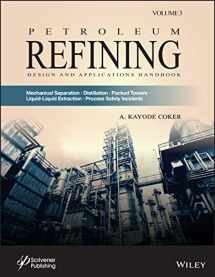
Petroleum Refining Design and Applications Handbook, Volume 3: Mechanical Separations, Distillation, Packed Towers, Liquid-Liquid Extraction, Process Safety Incidents
Book details
Summary
Description
PETROLEUM REFINING
The third volume of a multi-volume set of the most comprehensive and up-to-date coverage of the advances of petroleum refining designs and applications, written by one of the world’s most well-known process engineers, this is a must-have for any chemical, process, or petroleum engineer.
This volume continues the most up-to-date and comprehensive coverage of the most significant and recent changes to petroleum refining, presenting the state-of-the-art to the engineer, scientist, or student.
This book provides the design of process equipment, such as vessels for the separation of two-phase and three-phase fluids, using Excel spreadsheets, and extensive process safety investigations of refinery incidents, distillation, distillation sequencing, and dividing wall columns. It also covers multicomponent distillation, packed towers, liquid-liquid extraction using UniSim design software, and process safety incidents involving these equipment items and pertinent industrial case studies.
Useful as a textbook, this is also an excellent, handy go-to reference for the veteran engineer, a volume no chemical or process engineering library should be without. Written by one of the world’s foremost authorities, this book sets the standard for the industry and is an integral part of the petroleum refining renaissance. It is truly a must-have for any practicing engineer or student in this area.
This groundbreaking new volume: Assists engineers in rapidly analyzing problems and finding effective design methods and select mechanical specifications Provides improved design manuals to methods and proven fundamentals of process design with related data and charts Covers a complete range of basic day–to–day petroleum refining operations topics with new materials on significant industry changes Includes extensive Excel spreadsheets for the design of process vessels for mechanical separation of two-phase and three-phase fluids Provides UniSim ®-based case studies for enabling simulation of key processes outlined in the book Helps achieve optimum operations and process conditions and shows how to translate design fundamentals into mechanical equipment specifications Has a related website that includes computer applications along with spreadsheets and concise applied process design flow charts and process data sheets Provides various case studies of process safety incidents in refineries and means of mitigating these from investigations by the US Chemical Safety Board Includes a vast Glossary of Petroleum and Technical Terminology


We would LOVE it if you could help us and other readers by reviewing the book
Book review



